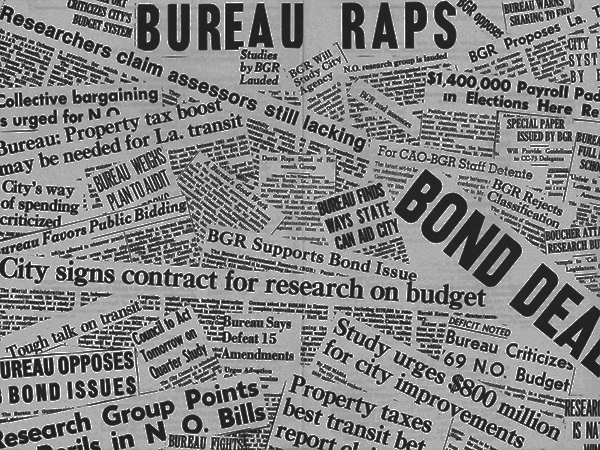
Government watchdog group endorses Tammany jail tax, but not courthouse tax
By Robert Rhoden
Source: NOLA.com | The Times-Picayune
March 2, 2018
The Bureau of Governmental Research is backing a St. Tammany Parish sales tax renewal for the operation and maintenance of the parish jail but is against a similar tax renewal for the parish courthouse.
BGR, a non-profit watchdog group, issued its recommendations Friday (March 2) after studying the March 24 ballot items as part of its regular series of reports on local propositions.
The loss of the jail tax would result in new budget cuts that would reduce parish services in other areas and potentially undermine jail operations and the quality of law enforcement, the government watchdog organization said.
Regarding the courthouse tax, BGR said the parish government has not clearly demonstrated to voters how much money is required for future operation and capital needs. It said parish leaders should offer voters a new tax proposal on the November or December ballot.
Parish President Pat Brister called the report on the courthouse tax “inaccurate.”
“I find it ironic that a New Orleans based organization is telling St. Tammany voters not to support our criminal justice system, a system that has been so effective in keeping our citizens safe and secure,” she said in a statement. “I cannot imagine what agenda would allow this decision.
“At the end of the day this is about public safety for the citizens of our parish. I will always put the public safety of the families who live here above all else.”
Voters March 24th will consider separate 10-year, 1/5th cent sales tax renewals that would generate about $9 million each to fund operations and maintenance of the jail and courthouse, both in Covington.
Those taxes were originally approved by voters in 1998 at the higher rate of 1/4 of a cent and for 20 years, and were used to build the $64 million courthouse and to pay for a $20 million expansion of the jail. The existing taxes, each generating about $11 million annually, are set to expire at the end of March.
In the spring of 2016, voters overwhelmingly rejected 20-year renewals of the taxes.
In response, the parish trimmed each of the renewal propositions to 1/5th of a cent and cut the duration to 10 years. They also dedicated at least 10 percent of the courthouse tax revenue to fund the various specialty courts, including drug court and behavioral health court.
The scaled-back propositions went on the ballot in April 2017, but voters rejected the renewals again, though by tiny margins.
Many citizens have argued that the sales taxes should not be renewed at such levels because they were put in place to build the courthouse and jail expansion and the construction bonds are about to be paid off.
Brister and the Parish Council decided to go back to the voters a third time, saying they would do a better job of educating the public on the importance of the taxes. Brister has said the taxes are vital to the quality of life in the parish and maintaining the current level of services at the courthouse and in the justice system.
BGR’s position on the courthouse tax mirrors that of the group Concerned Citizens of St. Tammany, which has complained that the parish government has not shown exactly how much money is needed to operate the courthouse. The citizens group recently suggested that parish government come back to voters with more modest proposals.
“Because the Parish has not provided voters with a clear spending plan, it is difficult to determine with certainty whether the renewal is scaled appropriately to projected needs,” BGR wrote.
Brister maintained the parish supplied the group all of the data.
Regarding the jail tax, BRG said renewing the tax at the proposed rate would leave some jail costs unfunded. Based on the Sheriff’s Office projections, the jail will need additional funding to offset future deficits and make necessary capital investments.
To better inform the public on the jail’s financial condition, the parish or the sheriff should post online the jail accountability reports, BGR said.
For each tax renewed, a household spending $20,000 a year would pay $40 instead of $50 a year, according to the group’s report. For each tax that expires, the household would pay $50 less in annual sales tax.
Early voting on the propositions begins March 10.
Fair Use Notice
This site occasionally reprints copyrighted material, the use of which has not always been specifically authorized by the copyright owner. We make such material available in our efforts to advance understanding of issues and to highlight the accomplishments of our affiliates. We believe this constitutes a “fair use” of any such copyrighted material as provided for in section 107 of the US Copyright Law. In accordance with Title 17 U.S.C. Section 107, the material on this site is available without profit. For more information go to: US CODE: Title 17,107. Limitations on exclusive rights: Fair use. If you wish to use copyrighted material from this site for purposes of your own that go beyond “fair use,” you must obtain permission from the copyright owner.
